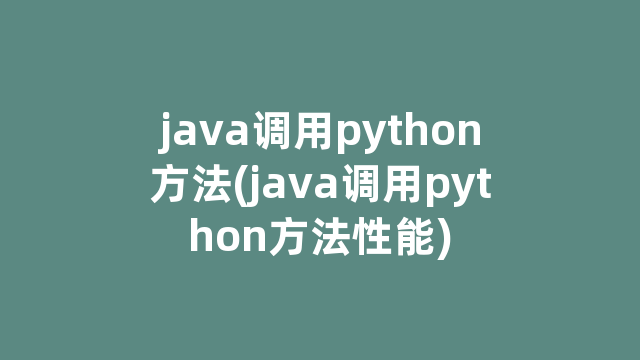
Java调用Python方法
In the world of programming, different languages serve different purposes and excel in various areas. However, sometimes it becomes necessary to integrate functionalities from multiple programming languages into a single application. In this article, we will explore the topic of invoking Python methods from Java, providing a bridge between these two powerful languages.
Why Integrate Java and Python?
Java and Python, both being popular programming languages, have their own strengths and weaknesses. Java is widely used in enterprise-level applications for its strong type checking, scalability, and platform independence. On the other hand, Python is renowned for its simplicity, readability, and vast libraries, making it a great choice for data analysis, scientific computing, and web development.
By combining the strengths of these two languages, developers can leverage the performance and reliability of Java alongside the flexibility and productivity of Python, creating powerful and versatile applications.
Approaches to Invoke Python Methods from Java
There are several approaches to enable Java to call Python methods. Let’s explore a few of them:
1. Using the ProcessBuilder Class
The ProcessBuilder class provides a way to start and control external processes from Java. By utilizing this class, we can execute Python scripts from Java and interact with them. This approach works by invoking the Python interpreter as a subprocess and passing relevant command-line arguments to execute the desired Python method.
2. Utilizing Jython
Jython is an implementation of Python written in Java. It seamlessly integrates with Java and allows executing Python code within a Java Virtual Machine (JVM). By using Jython, developers can directly invoke Python methods from Java, enabling seamless communication between the two languages.
3. Using Java Native Interface (JNI)
The Java Native Interface (JNI) facilitates communication between Java and native code, including Python. This approach involves writing a shared library in C/C++ that interfaces with Python and then using JNI to invoke the native methods from Java. Although this approach requires a deeper understanding of JNI and C/C++ programming, it offers more flexibility and performance.
Best Practices for Java-Python Integration
When integrating Java and Python, it is essential to follow certain best practices to ensure smooth communication and maintainability:
1. Proper Error Handling
Handle exceptions and errors gracefully when invoking Python methods from Java. Proper error handling mechanisms should be implemented to catch any exceptions thrown by Python and provide appropriate feedback to the Java application.
2. Data Serialization
Data serialization is critical when passing data between Java and Python. Use common data formats, such as JSON or XML, to serialize objects and exchange them between the two languages. This ensures compatibility and avoids compatibility issues caused by differences in data representations.
3. Version Compatibility
Ensure that the versions of Python and its libraries used in the integration are compatible with the Java environment. Mismatched versions can lead to unexpected behavior and compatibility issues. Maintain a consistent and well-documented environment to mitigate potential conflicts.
Conclusion
Integrating Java and Python allows developers to harness the strengths of both languages, creating robust and versatile applications. Whether through the ProcessBuilder class, Jython, or JNI, there are various approaches to enable Java to call Python methods. By following best practices and considering factors such as error handling, data serialization, and version compatibility, developers can seamlessly integrate these two powerful languages.
Remember, the art of integrating different programming languages lies in balancing their strengths and leveraging their capabilities to build innovative and efficient software solutions.
神龙|纯净稳定代理IP免费测试>>>>>>>>天启|企业级代理IP免费测试>>>>>>>>IPIPGO|全球住宅代理IP免费测试





